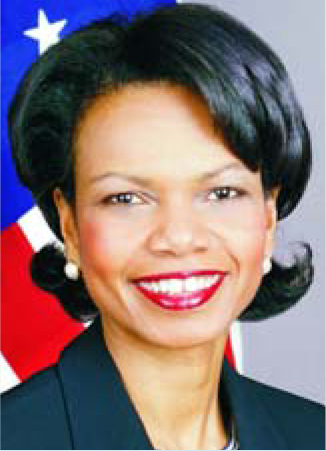US visa processing speeds up
DOI: 10.1063/1.2195310
The US State Department is taking steps to simplify travel into the country and counter the complications of security measures that have been piled on since the September 11th terrorist attacks. At a 17 January press conference, Secretary of State Condoleezza Rice and Homeland Security Secretary Michael Chertoff announced new visa application submission and screening procedures aimed at making travel to the US easier for foreign nationals, including students and researchers. The goal, Rice said, “is to get travel back up to pre-9/11 levels without downgrading security.”
At the press conference, Rice outlined the three pillars of the new procedures. First, on arrival in the US, visitors will be told in a selection of languages how to clear customs. Second, since US driver’s licenses will no longer be accepted as identity cards for travel to Canada or Mexico, the Department of Homeland Security is issuing a replacement travel document for US citizens. Third, and most significant for students and researchers, is a streamlined, electronic visa application process.
A trial of the new paperless application process will go into effect in the UK by December of this year. British citizens will be able to apply for visas electronically and attend interviews by teleconference, rather than having to travel up to hundreds of kilometers to a US consulate. If the trial is successful, the system will be deployed in other countries in 2007.
In addition, consulates in all countries will issue visas to US-bound visitors 120 days before their entry to the US, up from 90 days, and students and scientists will be permitted to enter the country 45 days before the start of their studies or research posts, up from 30 days. And since last June, a bilateral agreement has allowed Chinese applicants seeking US student, scholar, or vocational training visas to obtain 12-month, multiple-entry visas instead of six-month, single-entry visas. Some efforts at cutting wait times have also been implemented. “A Russian scientist who applied for a visa two years ago would have waited 75 days, perhaps even longer, while his application underwent additional screening and review,” Rice said. “Today that review time would take less than two weeks.”
Visa processing has improved, says the American Physical Society’s director of international affairs, Amy Flatten (see her article in Physics Today, February 2005, page 49
For the past three years, the US research community has been vocal about the need to improve the visa situation. A report from the Council of Graduate Schools, a Washington, DC–based nonprofit organization, says the numbers of foreign researchers and students in the US have dropped since September 11th, although last year saw a 1% increase in the number of foreign students in physical sciences at US universities. According to Rice, “Getting visas into the hands of foreign students is becoming a top priority.”

US STATE DEPARTMENT

More about the authors
Paul Guinnessy, American Center for Physics, One Physics Ellipse, College Park, Maryland 20740-3842, US . pguinnes@aip.org





